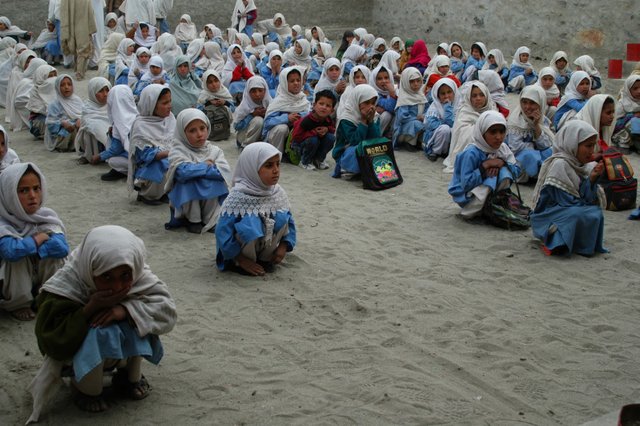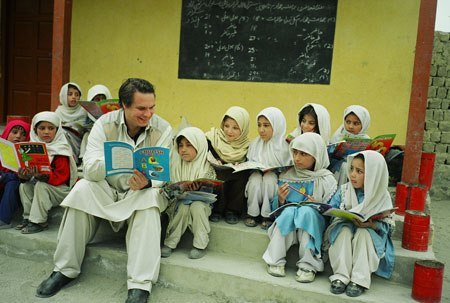Our Education system is only Focused on Exam,s
It is commanded in the Constitution of Pakistan to give free and obligatory training to all youngsters between the ages of 5-16 years and upgrade grown-up education. With the eighteenth established alteration the simultaneous rundown which involved 47 subjects was annulled and these subjects, including instruction, were exchanged to unifying units as a move towards commonplace independence.
The year 2015 is essential in the setting that it denotes the due date for the members of Dakar statement (Education For All [EFA] responsibility) including Pakistan. Training related insights combined with Pakistan's advancement in regards to instruction targets set in Vision 2030 and Pakistan's lingering behind in accomplishing EFA targets and its Millennium Development Goals(MDGs) for instruction require an investigation of the training arrangement of Pakistan and to investigate the issues and issues it is confronting so functional arrangements could be suggested.
What is Education System?
The arrangement of training incorporates all organizations that are engaged with conveying formal instruction (open and private, for-benefit and not-for-profit, nearby or virtual direction) and their resources, understudies, physical foundation, assets and guidelines. In a more extensive definition the framework additionally incorporates the foundations that are specifically engaged with financing, overseeing, working or directing such establishments (like government services and administrative bodies, focal testing associations, course reading sheets and accreditation sheets). The principles and controls that guide the individual and institutional connections inside the set up are likewise part of the training framework.
Instruction arrangement of Pakistan:
The instruction arrangement of Pakistan is involved 260,903 foundations and is encouraging 41,018,384 understudies with the assistance of 1,535,461 educators. The framework incorporates 180,846 open foundations and 80,057 private establishments. Subsequently 31% instructive organizations are controlled by private area while 69% are open foundations.
Investigation of training framework in Pakistan
Pakistan has communicated its pledge to advance training and proficiency in the nation by instruction approaches at residential level and getting included into global duties on instruction. In such manner national instruction approaches are the dreams which propose procedures to expand proficiency rate, limit building, and upgrade offices in the schools and instructive organizations. MDGs and EFA programs are worldwide responsibilities of Pakistan for the advancement of proficiency.

A survey of the instruction arrangement of Pakistan proposes that there has been little change in Pakistan's schools since 2010, when the eighteenth Amendment cherished training as an essential human right in the constitution. Issues of access, quality, foundation and disparity of chance, stay endemic.
Issues
A) MDGs and Pakistan
Because of the issues in instruction arrangement of Pakistan, the nation is falling behind in accomplishing its MDGs of training. The MDGs have set down two objectives for training part:
Objective 2: The objective 2 of MDGs is to accomplish Universal Primary Education (UPE) and by 2015, youngsters all around, young men and young ladies alike, will have the capacity to finish a full course of essential tutoring. Constantly 2014 the enrolment insights demonstrate an expansion in the enrolment of understudies of the age of 3-multi year while dropout rate diminished. Be that as it may, the requirement for expanding enrolment of understudies stays high to accomplish MDGs target. Punjab is driving territory shrewd in net essential enrolment rate with 62% enrolment. The enrolment rate in Sindh territory is 52%, in Khyber Pakhtunkhawa (KPK) 54% and essential enrolment rate in Balochistan is 45%.
Objective 3: The objective 3 of MDGs is Promoting Gender Equality and Women Empowerment. It is gone for taking out sex dissimilarity in essential and auxiliary training by 2005 and in all levels of instruction not later than 2015. There is an obvious divergence amongst male and female education rates. The national education rate of male was 71% while that of female was 48% out of 2012-13. Areas detailed a similar sexual orientation uniqueness. Punjab education rate in male was 71% and for females it was 54%. In Sindh education rate in male was 72% and female 47%, in KPK male 70% and females 35%, while in Balochistan male 62% and female 23%.
B) Education for All (EFA) Commitment
The EFA objectives center around early youth care and instruction including pre-tutoring, all inclusive essential training and auxiliary training to youth, grown-up proficiency with sex equality and nature of training as crosscutting topical and program needs.
EFA Review Report October 2014 diagrams that notwithstanding rehashed strategy duties, essential training in Pakistan is lingering behind in accomplishing its objective of general essential instruction. As of now the essential gross enrolment rate remains at 85.9% while Pakistan requires expanding it up to 100% by 2015-16 to satisfy EFA objectives. Of the evaluated add up to grade school going 21.4 million offspring of ages 5-9 years, 68.5% are selected in schools, of which 8.2 million or 56% are young men and 6.5 million or 44% are young ladies. Monetary Survey of Pakistan affirms that amid the year 2013-14 proficiency stayed significantly higher in urban territories than in country zones and higher among guys.
C) Vision 2030
Vision 2030 of Planning Commission of Pakistan searches for a scholastic domain which advances the reasoning personality. The objective under Vision 2030 is one educational modules and one national examination framework under state obligation. The methodologies graphed to accomplish the objective included:
(I) Increasing open use on instruction and abilities age from 2.7% of GDP to 5% by 2010 and 7% by 2015.
(ii) Re-present the specialized and professional stream over the most recent two long periods of optional schools.
(iii) Gradually increment professional and specialized training numbers to 25-30% of all optional enrolment by 2015 and 50 for each penny by 2030.
(iv) Enhance the scale and nature of training as a rule and the scale and nature of logical/specialized instruction in Pakistan specifically.
Issues: The issues prompt the appreciation of the issues which are looked in the advancement of training framework and advancement of education. The examination plots seven noteworthy issues, for example,

Lack of Proper Planning: Pakistan is a signatory to MDGs and EFA objectives. Anyway it appears that it won't have the capacity to accomplish these universal responsibilities in view of monetary administration issues and imperatives to accomplish the MDGs and EFA objectives.
Social imperatives: It is essential to understand that the issues which upset the arrangement of instruction are not only because of issues of administration by government yet some of them are profoundly established in the social and social introduction of the general population. Defeating the last is troublesome and would require an adjustment in state of mind of the general population, until the point that then widespread essential instruction is hard to accomplish.
Gender hole: Major factors that thwart enrolment rates of young ladies incorporate neediness, social requirements, absence of education of guardians and parental worries about wellbeing and versatility of their little girls. Society's accentuation on young lady's humility, insurance and early relational unions may confine family's ability to send them to class. Enrolment of provincial young ladies is 45% lower than that of urban young ladies; while for young men the distinction is 10% just, demonstrating that sex hole is a vital factor.
Cost of instruction: The monetary cost is higher in tuition based schools, yet these are situated in more extravagant settlements as it were. The Catch 22 is that non-public schools are better yet not all over the place and government schools guarantee evenhanded access but rather don't give quality instruction.
War on Terror: Pakistan's commitment in war against fear mongering additionally influenced the advancement of proficiency crusade. The activists focused on schools and understudies; a few instructive establishments were exploded, instructors and understudies were slaughtered in Balochistan, KPK and FATA. This may need to contribute not as much as different elements, but rather this remaining parts an imperative factor.
Funds for Education: Pakistan burns through 2.4% GDP on training. At national level, 89% instruction use involves current costs, for example, educators' compensations, while just 11% contains advancement consumption which isn't adequate to raise nature of training.
Technical Education: Sufficient consideration has not been paid to the specialized and professional training in Pakistan. The quantity of specialized and professional preparing organizations isn't adequate and many are denied of foundation, instructors and apparatuses for preparing. The number of inhabitants in a state is one of the fundamental components of its national power. It can turn into an advantage once it is gifted. Incompetent populace implies more jobless individuals in the nation, which influences the national advancement adversely. Accordingly, specialized instruction needs need taking care of by the legislature.
Destitution, peace circumstance, cataclysmic events, budgetary requirements, absence of access, low quality, value, and administration have additionally contributed in less enrolments.
An investigation of the issues and issues recommend that:
The official information demonstrates the distribution of assets for instructive activities yet there is no system which guarantees the correct use of those assets on training.
The current foundation isn't as a rule appropriately used in a few sections of the nation.
There are different difficulties that incorporate skill, institutional and limit issues, fashioning national union, uniform models for course reading improvement, and quality confirmation.
The personnel employing process is verifiably known to be politicized . It is a direct result of this that the nature of showing endures and considerably more so when low speculations are made in educators'.